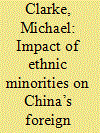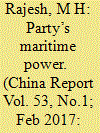| Srl | Item |
| 1 |
ID:
151165


|
|
|
|
|
| Summary/Abstract |
This article addresses the effect of foreign direct investment (FDI) flows from China to Korea, particularly in the case of the automobile industry. Despite the various positive effects that FDI brings to the growth of the automobile industry, concerns and doubts have been cast upon China’s overseas investment in Korea’s automobile industry, as FDI may involve the transfer of technology, and thereby, China may soon catch up with Korea technologically. The Shanghai Automotive Industrial Corporation’s (SAIC) acquisition of one of the automobile producers of Korea, Ssangyong Motor Corporation, and the consequent technology transfer or leakage have become a controversial national issue in Korea. This article draws the policy implications from the case of the former corporation’s acquisition of the latter in light of the economic development and industrialisation of developing countries in general.
|
|
|
|
|
|
|
|
|
|
|
|
|
|
|
|
| 2 |
ID:
151164


|
|
|
|
|
| Summary/Abstract |
This article argues, through a case study of the evolving impact of the Xinjiang and Uyghur issue, that the People’s Republic of China’s (PRC) ethnic minorities have been a significant factor in Beijing’s foreign relations throughout its history. Since the end of the Cold War in particular, China’s approach to the Xinjiang and Uyghur issue has played an important role in undergirding domestic stability and shaping its relations with Central Asia. More broadly, the case of Xinjiang and the Uyghur suggests that the nature and scale of the challenge posed by any one ethnic minority in the context of the PRC’s foreign policy has largely been a function of the interplay of five major factors: the historical relationship between the ethnic group and the Chinese state; the geographic concentration of an ethnic minority; the degree of acculturation to the dominant Han society; external great power support; and mobilised diasporas.
|
|
|
|
|
|
|
|
|
|
|
|
|
|
|
|
| 3 |
ID:
151167


|
|
|
|
|
| Summary/Abstract |
With rising contestations regarding maritime sovereignty in the Western Pacific and widening footprints,
the Chinese navy is the cynosure of strategic and military analysts. It is therefore appropriate to review
some of the major factors that influence its naval build up. This commentary serves as a primer on basic
roles and types of fleet1
and helps contextualize and complement the enormous volume of information
on the subject.
|
|
|
|
|
|
|
|
|
|
|
|
|
|
|
|